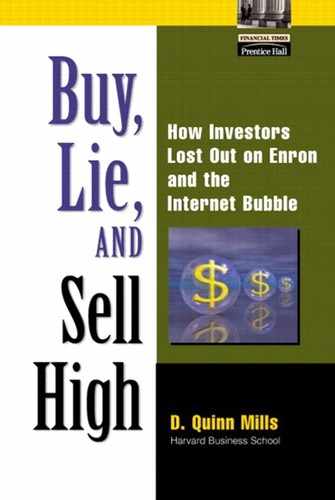The Financial Value Chain
The economic value that a company creates by producing and/or marketing goods and services does not automatically translate into financial value—the market value of its shares. The translation from one to the other is the role of a different set of institutions in our economy—including, in addition to others, banks, venture funds, and brokerage houses. This group of financial institutions constitutes the financial value chain. It's the mechanism by which the great Internet bubble was born, and the mechanism by which it died.
The system of specialized institutions and professionals who make up the financial value chain work to convert the economic value of a firm into financial value. Economic value doesn't transfer directly in the short-run into financial value, as theorists who believe in perfect markets predict, and ironically, for the very reason they focus on—that the transfer of the economic value of a firm into financial value requires a market, which makes the transfer subject to all the emotions and inefficiencies of all markets, at least in the short run.
Financial value is the current price of a company in the capital markets. Economic value is the long-term value of the company as measured by what the expected profits of the company over years to come are worth to investors today—formally, this means the discounted present value of the expected income stream based on reasonable assumptions. In perfectly functioning markets, the two are identical. There is a theory, called by economists the efficient market hypothesis, which holds that every day the capital market discovers the discounted present value of each financial instrument—including stocks, bonds, derivatives, and so forth—and values each correctly. But recent years have been very difficult ones for efficient market believers—financial values have departed too widely from economic values for efficiency of markets to be credible.
It may be argued that what the financial markets do not accomplish in the short term, they may accomplish in the longer term. That is, the markets do not accurately incorporate new information in the price of a stock in the short term, but over the longer term they do so. In the longer term, then, they are efficient.
This may be so, but it has little or no significance for our examination of the Internet bubble, since it is the short term with which we are concerned.
In the short term, the financial value of a company is in the eye of the beholder, and the financial marketplace exists to permit people with different views to buy and sell shares in companies. The price of a financial instrument, like a share of stock, is the amount of money at which financial value is currently available. Every transaction requires both a buyer and seller. Often the buyer looks at a stock with a different discount factor than the seller, so the buyer is willing to pay more than the seller is for the stock, so a trade occurs. For new companies which are generally small and untested, there is usually a great divergence of opinion about the future of the company, so that people discount the expected earnings of the firm in the future at very different rates. So there is often a wide spread between what a buyer will pay for the shares and what a seller hopes to get. Hence, there is potentially much volatility in the price of the stock. As a company gets larger and more experience accumulates with its financial performance, then the discount rates applied by different people converge, and the spread between offers and asking prices narrows.
The financial value chain exists because of an asymmetry in information (some people have more and better information than others), because of differences in perception about risk and value, and because there are conflicts of interest. Entrepreneurs and insiders know much more about a firm than investors can; managers have different interests than shareholders. Investors usually lack enough information to know of opportunities to support start-ups, and even if they know of opportunities, they lack information and expertise to determine the good investments from the bad.
So both entrepreneurs and investors rely on specialized intermediaries, including accountants, lawyers, regulatory bodies, investment banks, venture capitalists, money management firms, and the media, to link them together and thereby to turn the economic value created by entrepreneurs into financial value.
